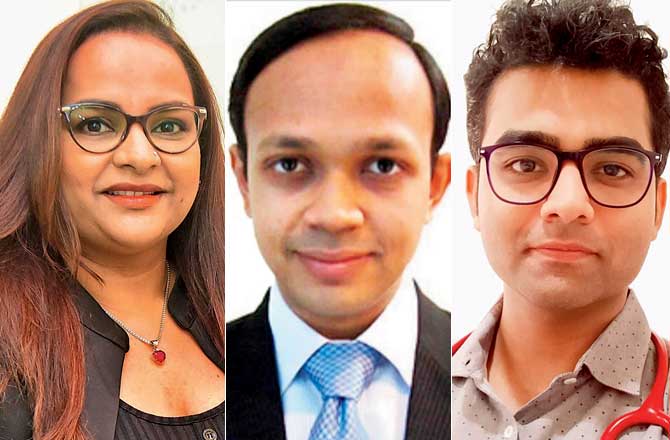Traditionally used as a wellness formula, intravenous shots are becoming a hot favourite among those wanting to boost their immunity. But is it safe, and does it work?

A patient receives IV nutrient therapy at Dr Rashmi Rai's clinic in Khar. The hydrating drip typically contains a blend of minerals, antioxidants and amino acids. Pics/Shadab Khan
While working as an intregrative lifestyle medicine specialist in Bangkok, Dr Rashmi Rai would routinely see patients walk in for intravenous (IV) shots for glowing skin or quick recovery from dehydration, allergies, and at times even hangovers. Later when she moved to Europe, she was exposed to a more advanced form of IV nutrient therapy. "There were dedicated drip lounges that offered services that became part of people's wellness routine," she says. After returning to Mumbai, she introduced the treatment at her Khar clinic. A rage in the west, intravenous infusions have emerged as a way to improve health from the inside out, after being endorsed by celebrities like Rihanna, Kim Kardashian, Chris Brown, Jane Fonda and Simon Cowell.
Since the Coronavirus outbreak, IV nutrient therapy is gaining favour as a quick and painless way to improve immunity. The hydrating drip typically contains a blend of IV fluids, vitamins, minerals, antioxidants and amino acids. Rai says the number of patients seeking IV nutrient therapy has doubled. The concept is not new, though. The first IV vitamin drips were developed and administered by a physician in Baltimore named Dr John Myers in the 1970s. His research led to the popular Myers' Cocktail, which works on the principle of increasing the blood concentration of several essential vitamins and minerals through IV infusion.
ADVERTISEMENT
Rai says the idea is also associated with digestive disturbances such as bloating, indigestion; these conditions may hinder the absorption of nutrients needed to return them to good health.

Dr Rashmi Rai, Dr Tushar Rane and Dr Amit Gawande
"A vitamin that's taken orally gets broken down in the stomach and digestive tract, and is limited to how much can be absorbed. But when the vitamin is given through an IV, it's absorbed at a much higher percentage as it directly hits the bloodstream," explains Rai. At her clinic, the process begins with a consultation, followed by a blood test and then another consultation before the actual session unfolds. If a complication crops up, they don't go ahead. People with allergies and heart conditions or kidney disease are advised to abstain from IV vitamin therapy because they cannot quickly remove certain minerals from the body.
The 45-minute to an hour-long procedure is relatively straightforward and can even span five to seven sessions depending on the treatment. Patients are hooked up to the IV via a vein in their hand or arm and simply asked to sit back and relax while the drip gets to work. Rai says there's no one-size-fits-all formula. "Each time a visitor comes for a session, we check for changes in routine, if they've had caffeine or added medicines to their regime or made any dietary changes." Just because it's a vitamin drip doesn't necessarily make it safe. Rai warns that an overdose of vitamins can also cause toxicity. "It has to be prescribed by your doctor and done under supervision." The cost of treatment per session is R10,000 onward.
Varun Anchan, associate vice president (content strategist and business) at a digital advertising agency, opted for the treatment when he learnt that his vitamin count was abysmally low. "I was losing a lot of weight. I shed eight kilos in the lockdown. I did a blood test that showed a low B12 count. I was at 100, while a normal person is supposed to be on 800 to 900. A friend suggested I try this." Anchan says that it so happened that after his first IV drip, he had gone on a road trip to Mangaluru. A bunch of his friends started showing symptoms for COVID-19. "All four of them tested positive, except me," says Anchan, who believes that his vitamin regimen could have protected him. After eight sessions, he admits to seeing a noticeable improvement in energy levels and ability to focus on the task at hand.
According to Dr Amit Gawande, consultant pulmonologist and critical care specialist, taking nutrients or vitamins orally or through IV does not guarantee prevention from COVID-19. "Vitamins will improve your immune system, which, in turn, might reduce the chances of you going down with a severe infection. So, you may still get the COVID infection, but it may be milder if your immune system is stronger." Dr Tushar Rane, Internal Medicine Expert, Apollo Spectra Hospital, says IV therapy to boost immunity is only done in moderate to severely ill patients and in hospital set-ups. "Traditionally, patients who are immuno-compromised, like in cases of cancer, uncontrolled diabetes and sepsis, are administered immunity boosters. They act as a backbone in building the immune system so as to cope up with the treatment for the underlying disease." Although rare, he says in cases, some immune boosters come with their own set of side-effects such as nausea, loose motions, giddiness and abdominal pain.
Keep scrolling to read more news
Catch up on all the latest Mumbai news, crime news, current affairs, and a complete guide from food to things to do and events across Mumbai. Also download the new mid-day Android and iOS apps to get latest updates.
Mid-Day is now on Telegram. Click here to join our channel (@middayinfomedialtd) and stay updated with the latest news
 Subscribe today by clicking the link and stay updated with the latest news!" Click here!
Subscribe today by clicking the link and stay updated with the latest news!" Click here!







